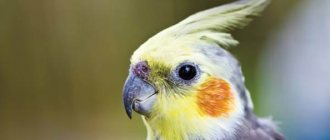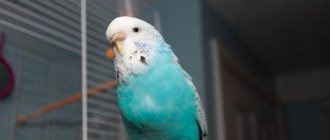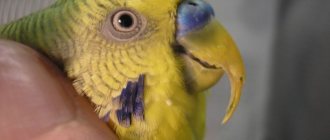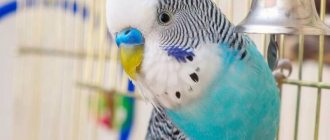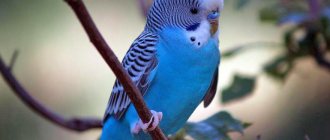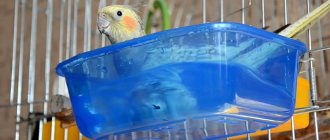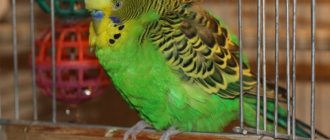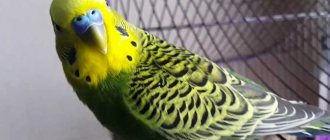Pneumonia
One of the most serious causes of heavy breathing can be pneumonia caused by a fungal or bacterial infection. Other symptoms of this disease include sneezing, wheezing, coughing with a whistling or squeaking sound, and tail wagging in time with breathing. The disease is very difficult to treat and is often complicated by pulmonary edema, which leads to death.
Treatment is carried out only after consultation with an ornithologist and its effectiveness depends on how soon after identifying the first symptoms you contact a specialist. In case of pneumonia, it is important that the bird does not starve. Force feeding of liquid food from a syringe through the beak will be required. More than five hours of fasting leads to the inevitable death of the bird.
Causes of rapid breathing
Parrots are very active birds that can fly long distances. Therefore, at home, a feathered friend can fly around the room for a long time, and upon landing, breathe frequently. In this case, you should not worry, since the phenomenon does not relate to pathological symptoms. During flight, a parrot's heart rate reaches one thousand beats per minute. In calm behavior mode, the heart beats approximately 600 beats per minute. If your parrot is breathing frequently after an active flight, there is no reason to panic. This is absolutely normal. In some situations, rapid breathing refers to pathological changes, the development of diseases in the small body of the bird. Among the diseases are the following pathologies:
- Lung diseases of various etiologies (pneumonia, aspergillosis);
- An allergic reaction to external irritants, especially if the bird has inhaled chemical vapors;
- The result of nervous shock, often occurs after severe fright;
- Polluted air (dust).
Before adopting methods to save the health of your feathered friend, you should accurately determine the cause of the disease. In cases where self-help is difficult, it is recommended to contact an animal clinic for a consultation with a qualified ornithologist. The sooner help is provided, the greater the chance of preventing complications and death. Some diseases are severe and require special treatment.
Aspergillosis
Aspergillosis is a respiratory disease caused by a group of molds that affects the respiratory system. Mushrooms choose the lungs as their habitat; they can only be identified using x-rays. Concomitant symptoms of the disease, in addition to difficulty breathing with an open beak, are fever, cough with blood discharge, refusal to eat, lethargy, drowsiness, loss of voice, severe respiratory failure.
The danger of fungal infection lies in its ubiquity. It is enough to place a bird with a weakened immune system in a very dusty, unventilated room or feed it moldy food, and fungal spores will quickly settle in its lungs. Effective treatment is possible only in the early stages of identifying the disease. In its advanced state, aspergillosis leads to the death of the bird. The treatment is very complex and can only be prescribed by a doctor. The weakened immunity of sick birds cannot always withstand it.
Parrot wheezing
Parrot wheezing
Forum question template: Diseases of budgerigars Species: Budgerigar Gender of the parrot: Male Age of the parrot: 1.5 months Name of food (manufacturer): Was mr.alex Daily portion of grain mixture for the parrot: I have no information Is there mineral stone, chalk, sepia in the cage?: Yes Does the parrot receive vitamins?: no Length of daylight hours for the parrot: — Dimensions of the cage: 75*45*45 Location of the cage with the parrot: On the cabinet, at chest level. Has the parrot been sick before?: No Symptoms of the disease that you observe: Yesterday I bought a bird. Quite young. At night and in the morning I heard that he was wheezing when breathing. How long ago did the first signs of the disease appear in the parrot: That night Post a photo of the parrot’s characteristic pose: No
Contaminated air
Sometimes the cause of a parrot's breathing problems can be indoor air contaminated with toxic substances. Avoid smoking, using deodorants and air fresheners near the bird cage. Even aromatic incense and the smell of washing powder can provoke illness.
Treatment of the consequences of toxic poisoning associated with difficulty breathing is usually lengthy and labor-intensive. But even following all the doctor’s instructions, you can lose your pet if respiratory failure develops.
Sinusitis
Purulent inflammation of the sinus mucosa. The symptom is swelling of the infraorbital sinus. In most cases, discharge appears from the nasal openings.
Breathing is accompanied by shortness of breath and wheezing. The causes of this disease are mechanical damage (wounds), deficiency of vitamin A, viral and fungal infections.
Antibiotics are widely used in treatment. Treatment is carried out in specialized clinics with surgery under anesthesia.
Stress
Parrots are very susceptible to various stressful situations. Breathing problems and even their death can occur as a result of fear, anxiety, too loud and disturbing surroundings, or attempts to handle them against their will. The parrot may not even like the location of the cage or the perch is too uncomfortable.
Most often, such problems arise with recently acquired birds. If a parrot is breathing heavily with its beak open, treatment can only consist of creating more comfortable conditions for it. But it is best to prevent such situations than to have difficulty getting rid of the consequences later.
Inflammatory process in the trachea
Inflammation can begin due to inhalation of toxic fumes that irritate the mucous membrane. Among such products are chemical detergents, perfumes, paints, and varnishes. If a parrot wheezes when breathing, then the cause may be a tracheal mite, which parasitizes the respiratory tract of the bird. Associated symptoms include difficulty breathing, whistling and wheezing in the chest. The bird constantly opens its mouth, eats poorly, and coughs. The doctor prescribes treatment based on the data obtained. The diet must include calcium.
Why do chickens wheeze? Analysis of the main causes and methods of eliminating wheezing in chickens
Even the most experienced and responsible farmers are unable to prevent chickens from getting sick; in practice, it is impossible to protect the farm from this. Therefore, any poultry enterprise or farming is not insured against unplanned, sometimes huge, financial losses. After all, poultry, along with other animals, does not have a strong immune system and suffers from many infections, from which it cannot be completely protected. In this article we will take a closer look at the question: why do chickens wheeze and how to deal with it.
How are wheezing and cough treated?
The appearance of any wheezing in the lungs means a pathological process , most often inflammation, so you must undergo an examination and pass all the tests recommended by your doctor.
In any case, the main thing is to treat the underlying disease. For dry wheezing, if they indicate the onset of the disease, doctors recommend taking medications to combat the inflammatory process and thin the mucus. Bronchodilators have a good effect, they also help in case of an allergic reaction in asthma.
Possible complications
Failure to provide assistance is fraught with progression of the underlying disease. The further prognosis depends on what disease has affected the parrot.
In the absence of help, the risk of death of the bird is high.
Call a veterinarian to your home 24 hours a day
Our veterinary center employs an experienced ornithologist who is ready to visit your home 24 hours a day. The service of visiting a specialist is in great demand, as it allows the client to:
- do not waste time on the road, which takes several hours,
- save money – for all clients, regardless of the place of service, we provide favorable prices,
- show the doctor all the animals living with you,
- receive recommendations for improving living conditions.
Almost all therapeutic and diagnostic procedures and blood tests are carried out at home.
Emergency teams are working and respond urgently within 30 minutes.
They are necessary in extreme situations when the pet is in serious condition, for example, after an accident, poisoning or burn.
If the situation is not urgent, call at any time and agree on a suitable day to meet with a specialist, for example, after work or on the weekend.
On the website you will find all contacts for feedback, you can call, write an email or order a call back.
General services
| Prices for services in our clinic | In the clinic and at home |
| Ornithologist visiting your home | from 500 |
| Clinical examination, preliminary diagnosis, consultation | from 500 |
| Telephone consultation | for free |
| Therapy | from 150 |
| Surgery | from 150 |
| Ambulance at home (within an hour) | from 1000 |
Therapy
| Prices for services in our clinic | In the clinic and at home |
| Subcutaneous administration of medication to birds | from 200 |
| Intramuscular administration of medication to birds | from 150 |
| Intravenous administration of the drug to birds | from 500 |
| Bird dropper | from 1000 |
| Administration of the drug intraperitoneally, intraosseously | from 800 |
| Nerve receptor blockade in birds | from 500 |
| Tube feeding of birds | from 300 |
| Cleaning the horny cover | from 400 |
| Resuscitation treatment of birds | from 1500 |
| Infusion therapy | from 250 |
| Intravenous catheter placement | 500 |
| Removing the IV catheter | 500 |
| Removing the Marking Ring | from 200-1000 |
| Taking blood for laboratory tests | from 350 |
| Obstetrics in birds | 1 hour from 500 |
| Washing the crop | from 500 |
| Trimming: | |
| Beak | 500 |
| Claws | 500 |
| Krylyev | 500-1000 |
| Tail | 500-1000 |
Surgery and Traumatology
| Prices for services in our clinic | In the clinic and at home |
| Surgical treatment of wounds | from 200-1000 |
| Stitching | from 300-1500 |
| Application of a splint | from 300 |
| Opening abscesses, hematomas | from 300 |
| Removal of tumors | from 1000 |
| Goiter surgery | from 1500 |
| Cloaca surgery | from 1500 |
| Removal of foreign bodies | from 1500 |
| Eye amputation | from 2000 |
| Pelvic limb amputation | from 2500 |
| Osteosynthesis | from 10000-30000 |
| Surgery for goiter rupture | from 1500 |
| Egg extraction | from 500 |
| Anesthesia for birds | from 1500-3500 |
| Puncture of air sacs | from 1000 |
| Abdominal wall puncture | from 1000 |
Anesthesiology for birds
| Prices for services in our clinic | In the clinic and at home |
| Anesthesia | from 500 |
Ophthalmology
| Prices for services in our clinic | In the clinic and at home |
| Eyelid surgery for inversion, eversion | from 2000 |
| Exenteration of the eyeball | from 3000 |
Laboratory research
| Prices for services in our clinic | In the clinic and at home |
| Taking tests | 500 |
| Clinical blood test | 1000 |
| General clinical blood test | 1000 |
| Blood chemistry | 2000 |
| Microscopy of blood parasites | 700 |
| Smear microscopy | 700 |
| Examination of droppings for protozoa | 1000 |
| Examination of droppings for helminths | 700 |
| Determination of gender | 2000 |
| Histological examination | 2500 |
| Examination of droppings for helminths | 700 |
| Infectious anemia of chickens | 1500 |
| Test for infectious encephalomyelitis | 1500 |
| Analysis for infectious bronchitis of birds | 1500 |
| Analysis for infectious rhinotracheitis in birds | 1500 |
| Salmonellosis test | 1500 |
| Testing for trichomoniasis | 1500 |
| Tuberculosis test | 1500 |
| Examination of droppings for protozoa | 1000 |
| Analysis for psittacosis | 1500 |
| Analysis for pasteurellosis | 1500 |
| Avian influenza test | 1500 |
| Analysis for dysbacteriosis | 2000 |
| Analysis for avian mycoplasmosis | 1500 |
| Newcastle disease test | 1500 |
| Analysis for avian leukemia | 1500 |
| Test for Marek's disease | 1500 |
| Analysis for avian adenovirus | 1500 |
| Analysis for avian circovirus | 2000 |
| Analysis for yeast-like fungi | 1700 |
| Comprehensive analysis for anthropozoonoses | 4000 |
| General bacteriological analysis | 3000 |
| Gumboro disease | 1500 |
| Avian reovirus | 1500 |
Types of wheezing
Wheezing is extraneous noise that occurs when gas exchange is disrupted.
Inspiratory crackles in the chest are any form of non-physiological noise. These also include sounds that occur when the rib rubs against the pleura. Extraneous noise is generated as a result of the fact that before entering the lungs, air flows for gas exchange must first pass through the remaining paths of the respiratory system, where there may be obstacles. Most often they are foreign bodies, lumps of mucus and/or narrowing of the lumen.
Hoarseness, depending on the developing pathology, differs in prevalence, duration and tone. Based on what he “heard,” the doctor, as a rule, can initially diagnose a list of diseases.
If there is wheezing in the chest, the patient is also often worried about increased body temperature, dry or wet cough, and pain. To prevent complications from rapidly developing, you need to immediately begin treating the disease. It is especially important to start a therapeutic course as early as possible if symptoms appear in children, since the fragile immune system is not able to fully fight pathogens.
Breath sounds in medicine are classified into the following types:
There is also a separate classification for moist rales:
- large-bubble;
- medium bubbly;
- finely bubbled.
The diagnosis depends on the characteristics of wheezing in a particular patient. To confirm/refute the diagnosis, doctors in most cases prescribe the patient a list of instrumental and laboratory tests.
The condition is also often accompanied by the manifestation of typical signs of intoxication (poisoning) of the body and swelling of the lungs, which is characterized by bubbling and gurgling wheezing in the chest area.
Disease Prevention
As noted above, it is impossible to completely protect livestock from diseases, but this probability can be minimized. To do this you need to adhere to the following rules:
- The manifestation of symptoms in one chicken is a reason to inspect the entire flock, since there is a high chance of infection of several individuals at the same time. They all need to be kept separate from healthy birds. At the same time, if possible, infected chickens are given better living conditions and given food with a high content of vitamins and minerals.
- There should be no drafts or dampness in the poultry house, and the temperature should not fall below 15°C.
- Poultry keeping areas are regularly disinfected.
Self-medication is not always effective. The disease can develop, become more severe and lead to mass death of birds. It is better to consult your veterinarian first.
